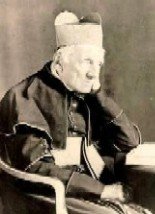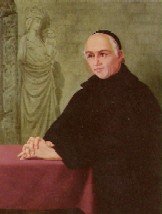Venerable John Henry Newman (1801-1890)
 John Henry Newman was born on 21st February, 1801, in London, the eldest son of a London banker. His family were ordinary church-going members of the Church of England, without any strong religious tendencies, though the young John Henry did learn at an early age to take a great delight in the Bible. He was sent to Ealing School in 1808, and it was there, eight years later, that he underwent a profound religious conversion, which was to determine the rest of his life as a quest for spiritual perfection. In 1817 he entered Trinity College, Oxford, where he was a very successful student. Five years later he was elected to a coveted Fellowship of leading Oriel College. He was ordained and worked, first as a curate in the poor Oxford Parish of Saint Clement’s, and a little later as Vicar of the University Church of Saint Mary the Virgin. There, his spiritual influence on his parishioners and the members of the University was truly enormous. He worked as a College Tutor, and a little later began to research the first of the many theological works which were to put him at the forefront of religious writers.
John Henry Newman was born on 21st February, 1801, in London, the eldest son of a London banker. His family were ordinary church-going members of the Church of England, without any strong religious tendencies, though the young John Henry did learn at an early age to take a great delight in the Bible. He was sent to Ealing School in 1808, and it was there, eight years later, that he underwent a profound religious conversion, which was to determine the rest of his life as a quest for spiritual perfection. In 1817 he entered Trinity College, Oxford, where he was a very successful student. Five years later he was elected to a coveted Fellowship of leading Oriel College. He was ordained and worked, first as a curate in the poor Oxford Parish of Saint Clement’s, and a little later as Vicar of the University Church of Saint Mary the Virgin. There, his spiritual influence on his parishioners and the members of the University was truly enormous. He worked as a College Tutor, and a little later began to research the first of the many theological works which were to put him at the forefront of religious writers.In 1833 he went on a tour of the Mediterranean with a friend who was in very poor health. While in Sicily he himself fell desperately ill with fever. On his recovery it struck him that God had spared him to perform a special task in England. On his return home he eagerly set about organising what was to become know as the Oxford Movement. The Movement, which spread rapidly, was intended to combat three evils threatening the Church of England – spiritual stagnation, interference from the state, and doctrinal unorthodoxy.
 When studying the history of the early Christian Fathers in 1839, Newman received an unexpected shock, for it appeared that the position of his own Church bore a close resemblance to that of the early heretics. He was also worried when many of the English Bishops denounced one if his works a few years later – some not just denouncing but going out of the way to espouse heretical positions themselves. He decided to partly retire from Oxford, and, joined by a few others a little later, he moved to quarters at the nearby hamlet of Littlemore. For three years he lived a strict religious life, praying for light and guidance. By 1845 he saw his way clear, and on 9th October he was received into the Roman Catholic Church by Father, now Blessed, Dominic Barberi. He had at last found ‘the One True Fold of the Redeemer’.
When studying the history of the early Christian Fathers in 1839, Newman received an unexpected shock, for it appeared that the position of his own Church bore a close resemblance to that of the early heretics. He was also worried when many of the English Bishops denounced one if his works a few years later – some not just denouncing but going out of the way to espouse heretical positions themselves. He decided to partly retire from Oxford, and, joined by a few others a little later, he moved to quarters at the nearby hamlet of Littlemore. For three years he lived a strict religious life, praying for light and guidance. By 1845 he saw his way clear, and on 9th October he was received into the Roman Catholic Church by Father, now Blessed, Dominic Barberi. He had at last found ‘the One True Fold of the Redeemer’.Conversions meant ostracism by friends and relatives. Undaunted, Newman set out for Rome to study for the priesthood. While there he became attracted by the idea of the Oratory – a Congregation of priests founded by Saint Philip Neri in the sixteenth century. He founded the first English Oratory at Maryvale, near Birmingham, in 1848, moving soon afterwards to Alcester Street, near the town centre, where he converted a disused gin distillery into a chapel. They moved to a new and more permanent base three years later, but throughout continued to be engulfed by work among the poor Catholics of what was soon to become a city.
In 1851 the Bishops of Ireland decided that a separate University should be established for Catholics, and invited Newman to become its founder and first Rector. It was a demanding task for an older man, but despite the strain of fifty six crossings to and from Ireland in seven years, he succeeding in establishing what is know today as University College, Dublin.
When he returned to England, Newman faced a life of trials, as he was suspected and even resented by some in authority. Several projects which he took up, including a magazine for educated Catholics, a mission at Oxford, and a new translation of the Bible, met with rejection or failure.
During old age, Newman continued in Birmingham, quietly writing, preaching and counselling (from the age of twenty three he had been above all a pastor – ‘a father of souls’) until, when seventy eight, a big surprise came. As a tribute to his extraordinary work and devotion, Pope Leo XIII made the unprecedented gesture of naming Newman, an ordinary priest, a Cardinal. After a life of trials the news came as an joyful relief and Newman declared ‘the cloud is lifted for ever’. Cardinal Newman died on 11th August 1890 and received a universal tribute of praise. The Times wrote: ‘whether Rome canonises him or not he will be canonised in the thoughts of pious people of many creeds in England.’ The Cork Examiner affirmed that, ‘Cardinal Newman goes to his grave with singular honour of being by all creeds and classes acknowledged as the just man made perfect.’
Mr Gerard Tracey